Resume
New Grad Nurse Cover Letter Examples

May 29, 2025
|
12 min read
Learn how to ace your new grad nurse cover letter with tips and tricks to impress hiring managers, and remember: stitching together words can be as important as stitching wounds. Ensure your first professional step is well-bandaged.
4.70 Average rating
Rated by 348 people
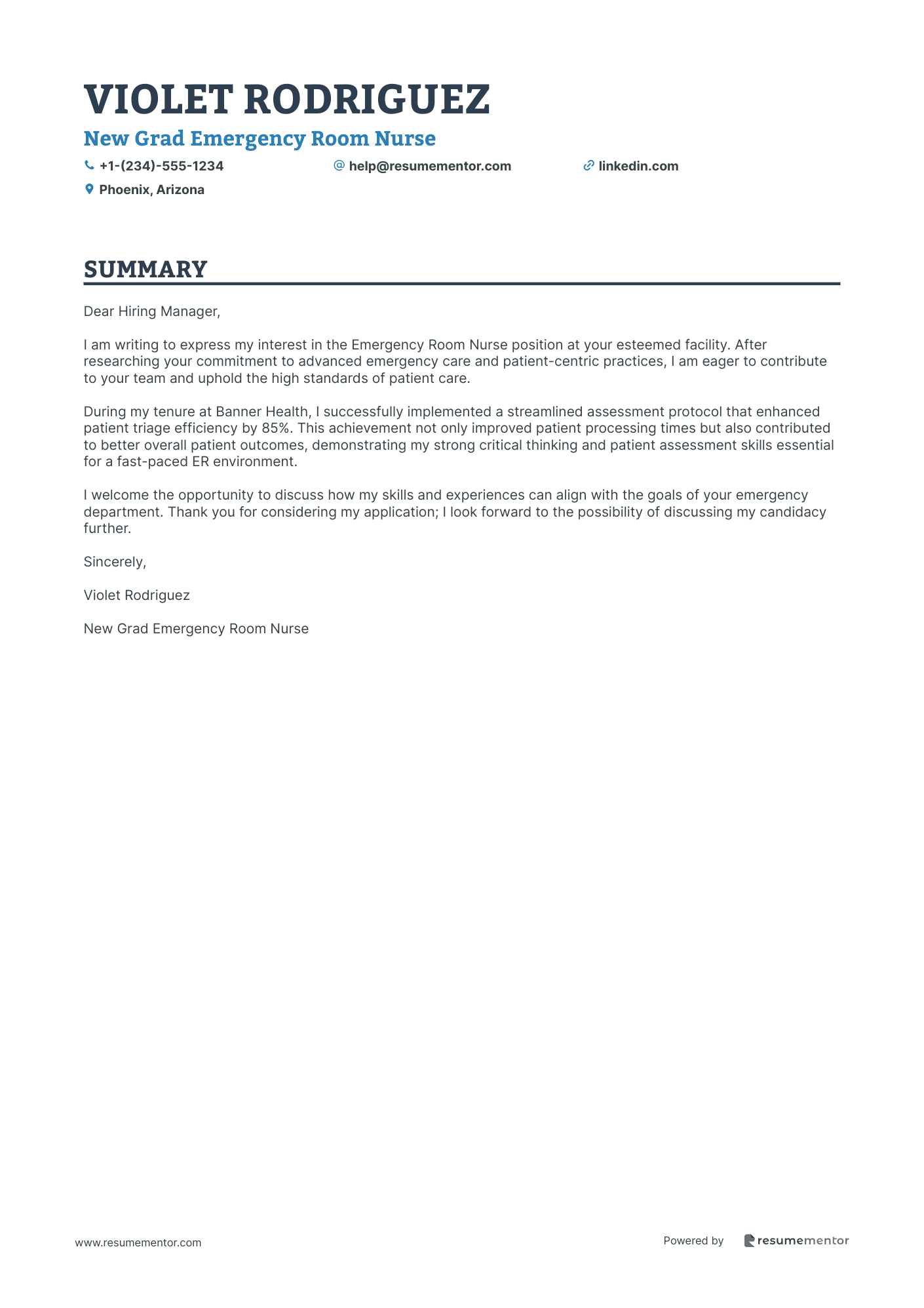
New Grad Emergency Room Nurse
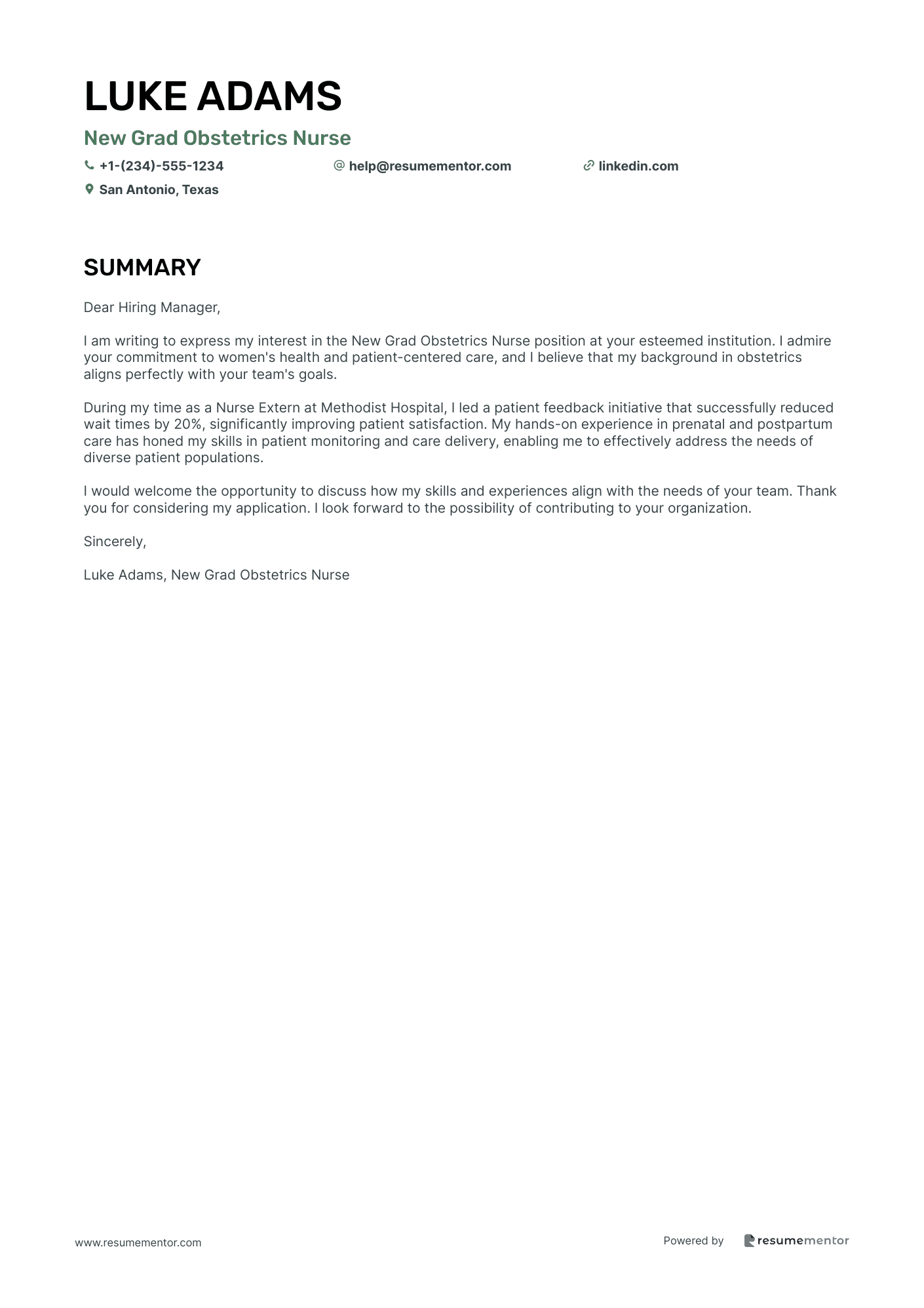
New Grad Obstetrics Nurse
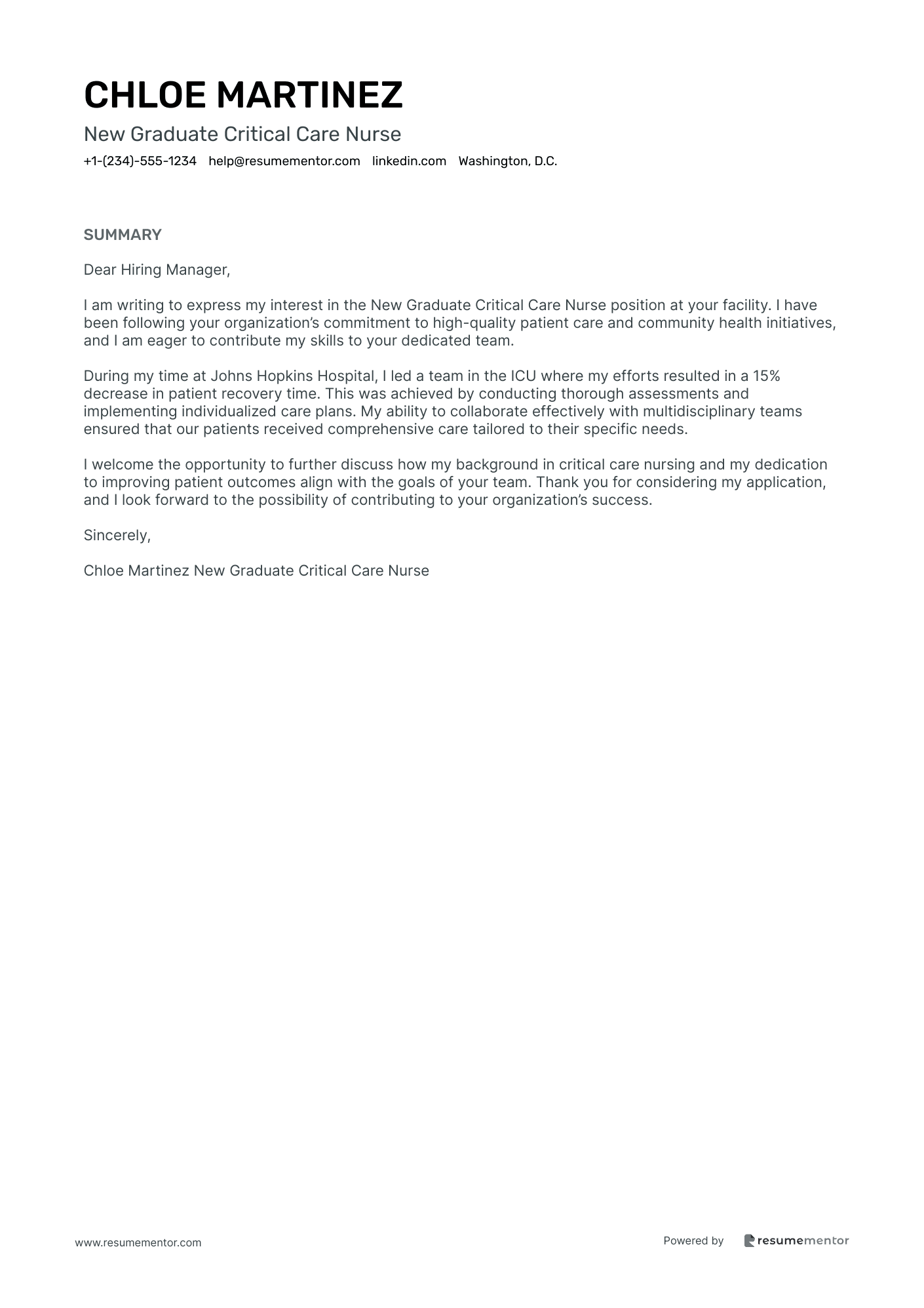
New Graduate Critical Care Nurse
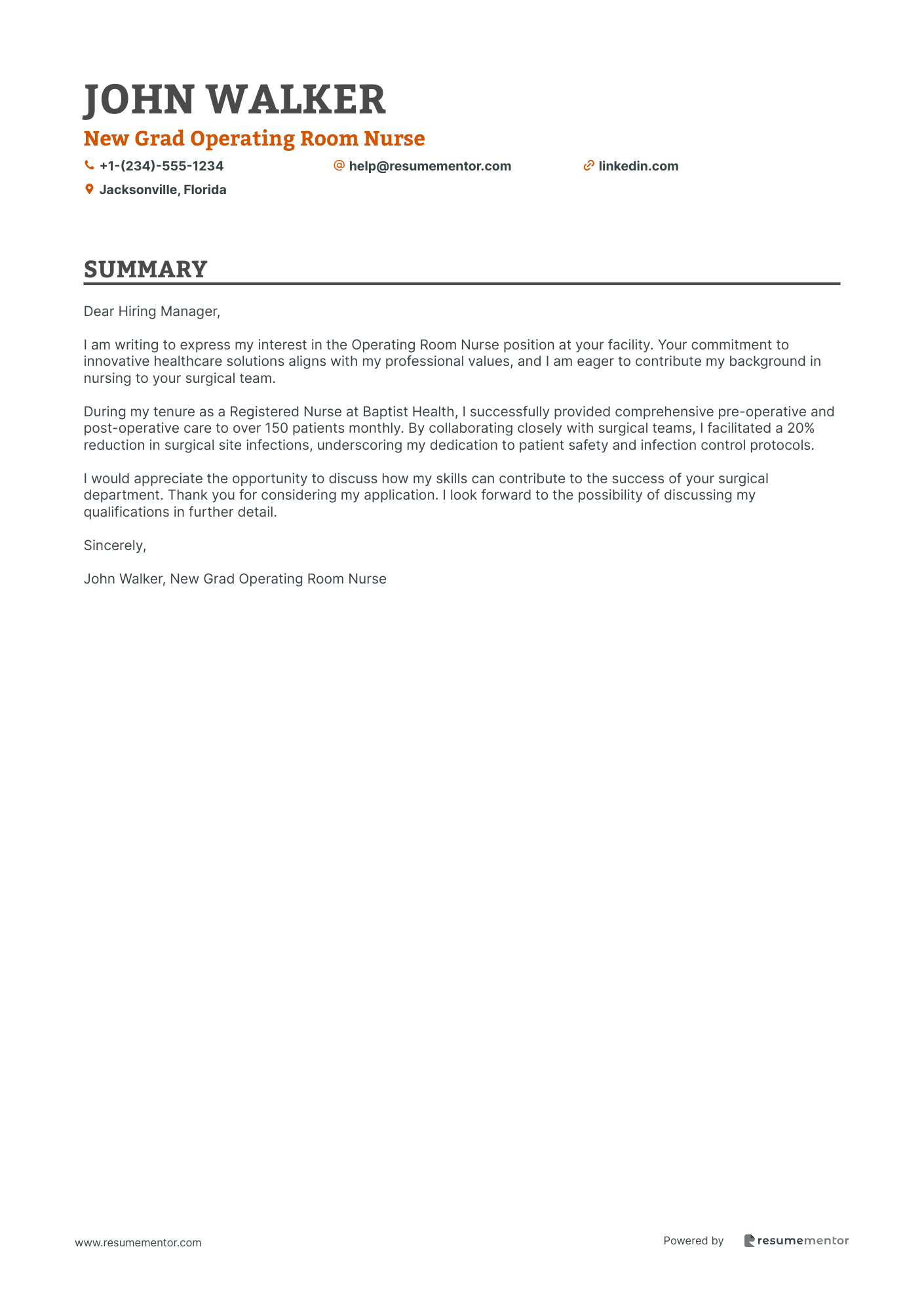
New Grad Operating Room Nurse
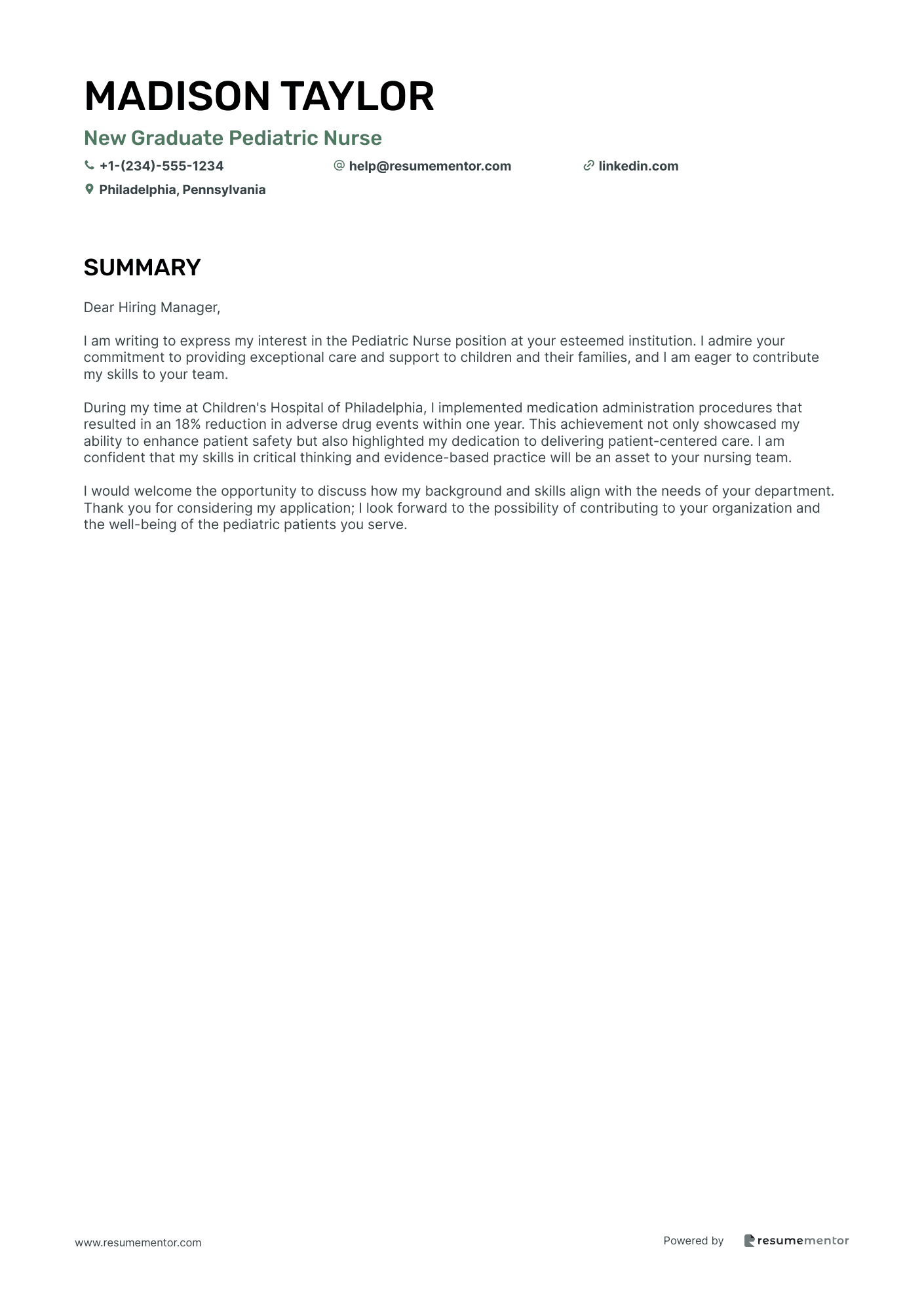
New Graduate Pediatric Nurse
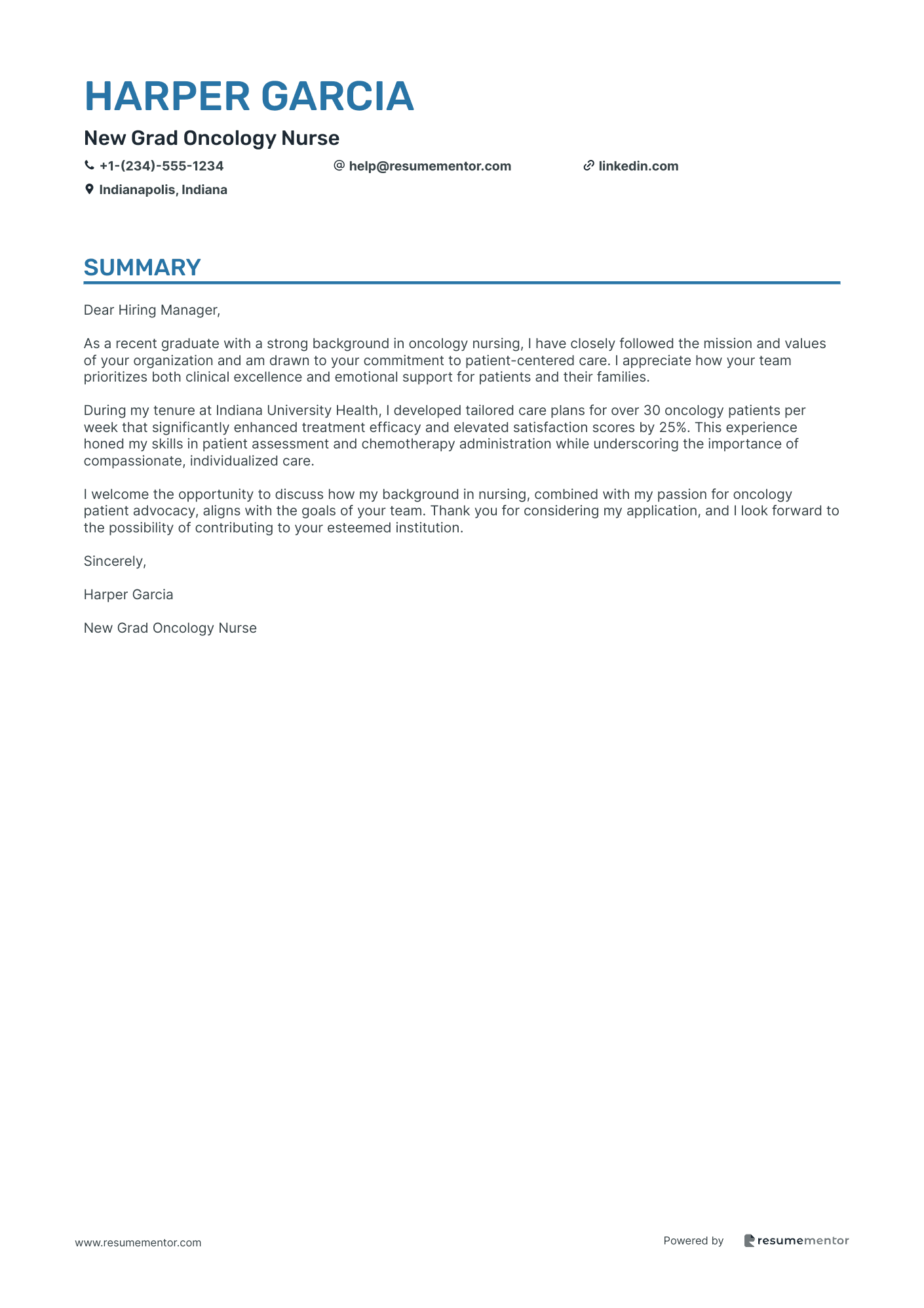
New Grad Oncology Nurse
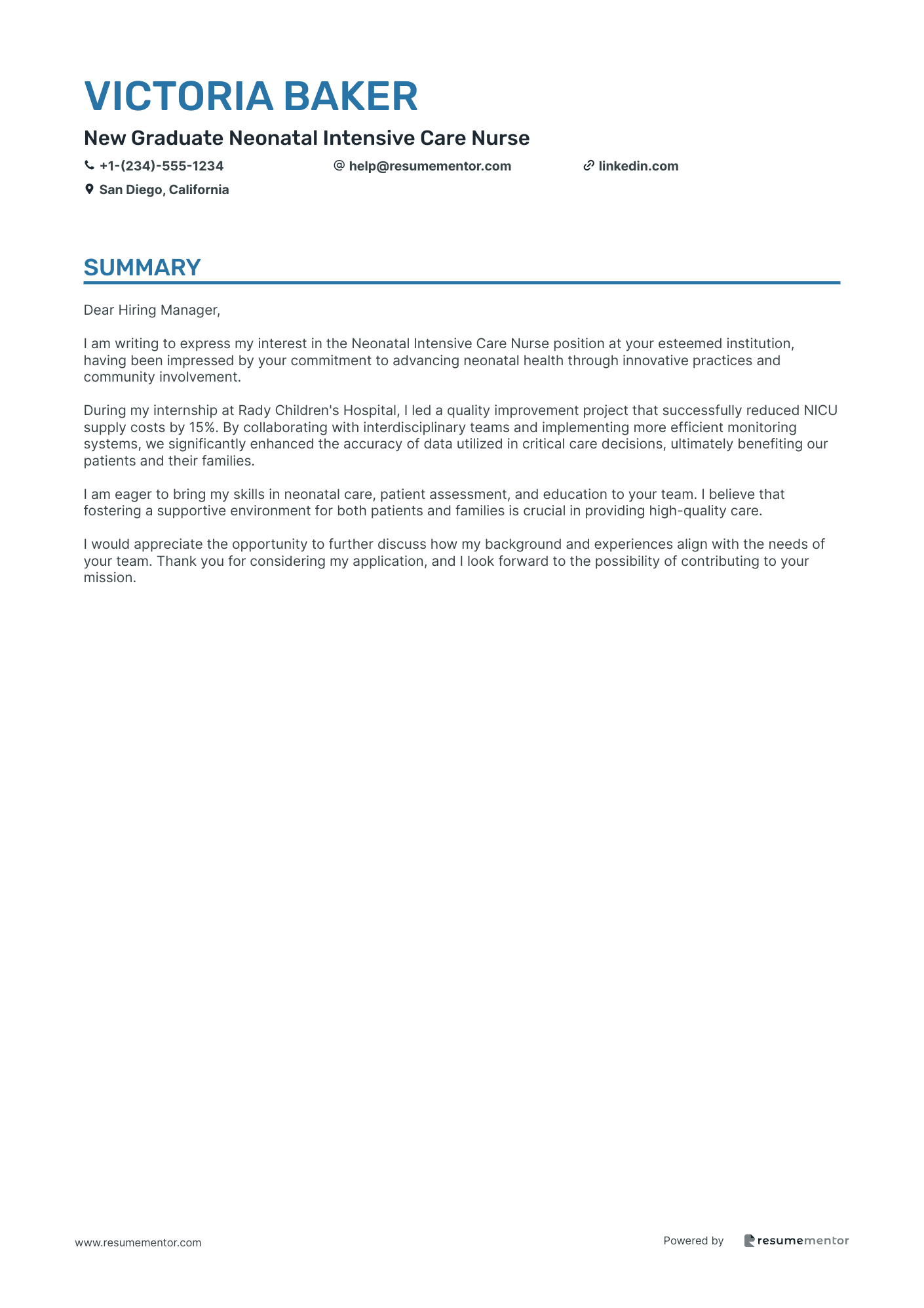
New Graduate Neonatal Intensive Care Nurse
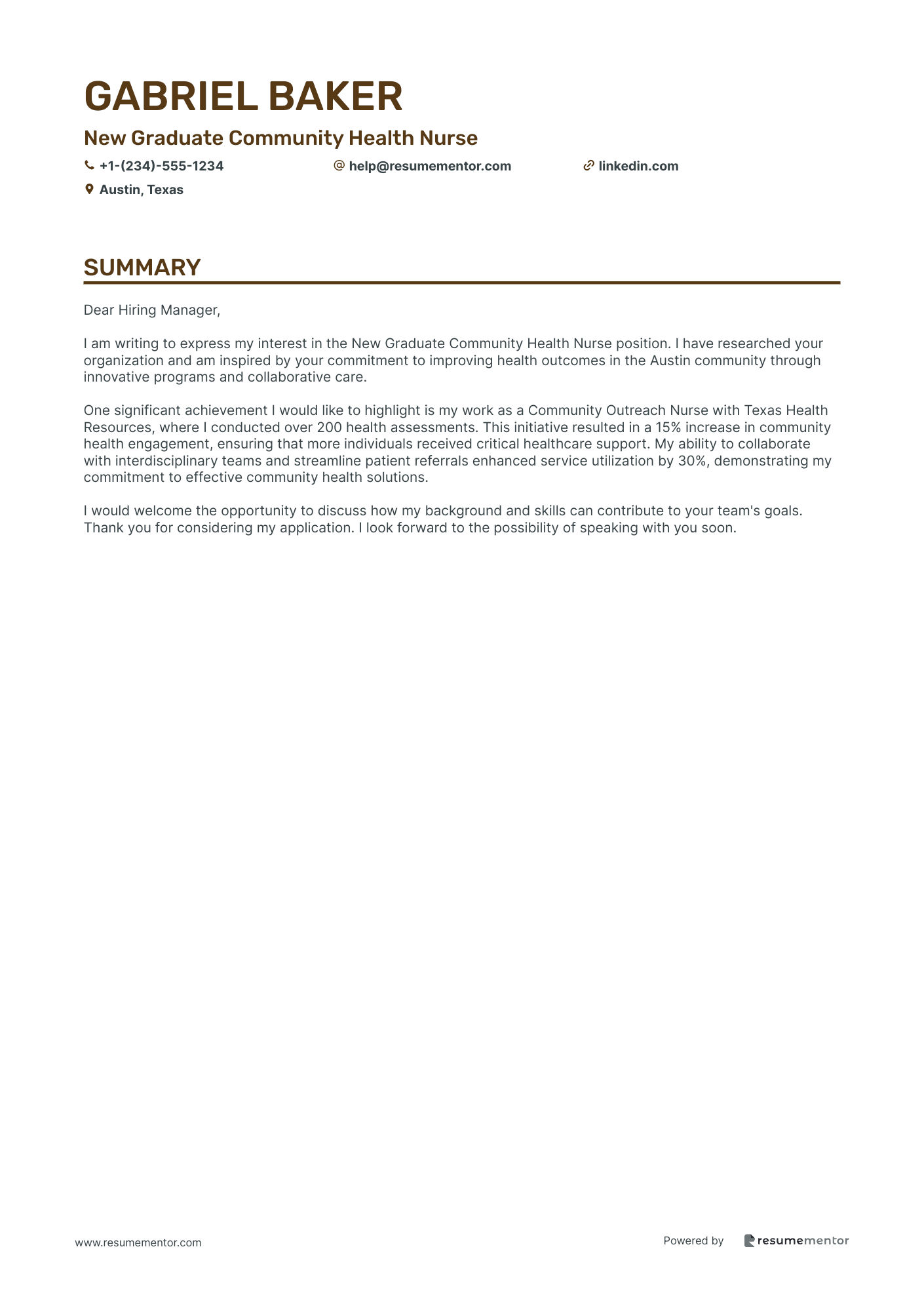
New Graduate Community Health Nurse

New Grad Emergency Room Nurse cover letter sample
When crafting your cover letter, prioritize highlighting any clinical rotations or internships in high-pressure environments. Showcase your ability to perform under stress, as this is essential for maintaining patient care. Mention any certifications like Basic Life Support (BLS) or Advanced Cardiac Life Support (ACLS) that enhance your qualifications. Include specific instances where your quick thinking improved patient outcomes or resolved issues swiftly. Use a 'skill-action-result' format to clearly illustrate how your training and actions contributed to team success in previous experiences.
Violet Rodriguez
New Grad Emergency Room Nurse
Summary
Dear Hiring Manager,
I am writing to express my interest in the Emergency Room Nurse position at your esteemed facility. After researching your commitment to advanced emergency care and patient-centric practices, I am eager to contribute to your team and uphold the high standards of patient care.
During my tenure at Banner Health, I successfully implemented a streamlined assessment protocol that enhanced patient triage efficiency by 85%. This achievement not only improved patient processing times but also contributed to better overall patient outcomes, demonstrating my strong critical thinking and patient assessment skills essential for a fast-paced ER environment.
I welcome the opportunity to discuss how my skills and experiences can align with the goals of your emergency department. Thank you for considering my application; I look forward to the possibility of discussing my candidacy further.
Sincerely,
Violet Rodriguez
New Grad Emergency Room Nurse
New Grad Obstetrics Nurse cover letter sample
Highlight your clinical rotations and any hands-on experiences related to maternal and infant care. Emphasize your ability to work under pressure and make quick decisions in high-stress situations. Showcase your strong interpersonal skills, as empathy and communication are key when dealing with patients and families. Include any relevant certifications, such as Basic Life Support or Neonatal Resuscitation Program, to demonstrate your commitment to safety. Use specific examples to illustrate how you've positively impacted patient outcomes, such as through education or support during labor and delivery.
Luke Adams
New Grad Obstetrics Nurse
Summary
Dear Hiring Manager,
I am writing to express my interest in the New Grad Obstetrics Nurse position at your esteemed institution. I admire your commitment to women's health and patient-centered care, and I believe that my background in obstetrics aligns perfectly with your team's goals.
During my time as a Nurse Extern at Methodist Hospital, I led a patient feedback initiative that successfully reduced wait times by 20%, significantly improving patient satisfaction. My hands-on experience in prenatal and postpartum care has honed my skills in patient monitoring and care delivery, enabling me to effectively address the needs of diverse patient populations.
I would welcome the opportunity to discuss how my skills and experiences align with the needs of your team. Thank you for considering my application. I look forward to the possibility of contributing to your organization.
Sincerely,
Luke Adams, New Grad Obstetrics Nurse
New Graduate Critical Care Nurse cover letter sample
When crafting your cover letter, it’s important to highlight your clinical rotations in critical care or any relevant internships. Discuss your hands-on experience with patient monitoring, intravenous therapy, or emergency response. Emphasize your teamwork and collaboration skills, especially in high-pressure environments. If you have certifications like Basic Life Support or Advanced Cardiac Life Support, mention these to show your commitment to ongoing education. Use specific examples to demonstrate how your quick thinking improved patient outcomes, utilizing a 'skill-action-result' framework to clarify your impact.
Chloe Martinez
New Graduate Critical Care Nurse
Summary
Dear Hiring Manager,
I am writing to express my interest in the New Graduate Critical Care Nurse position at your facility. I have been following your organization’s commitment to high-quality patient care and community health initiatives, and I am eager to contribute my skills to your dedicated team.
During my time at Johns Hopkins Hospital, I led a team in the ICU where my efforts resulted in a 15% decrease in patient recovery time. This was achieved by conducting thorough assessments and implementing individualized care plans. My ability to collaborate effectively with multidisciplinary teams ensured that our patients received comprehensive care tailored to their specific needs.
I welcome the opportunity to further discuss how my background in critical care nursing and my dedication to improving patient outcomes align with the goals of your team. Thank you for considering my application, and I look forward to the possibility of contributing to your organization’s success.
Sincerely,
Chloe Martinez New Graduate Critical Care Nurse
New Grad Operating Room Nurse cover letter sample
When crafting your cover letter, highlight your clinical rotations and any hands-on experience in the surgical setting. Mention your ability to work in high-pressure environments, as teamwork is crucial in the operating room. Certifications like Basic Life Support (BLS) or Advanced Cardiovascular Life Support (ACLS) should be noted to demonstrate your preparedness. Provide specific examples of how your quick decision-making skills have positively influenced patient outcomes, using a 'skill-action-result' approach to show how you can contribute to the team effectively.
John Walker
New Grad Operating Room Nurse
Summary
Dear Hiring Manager,
I am writing to express my interest in the Operating Room Nurse position at your facility. Your commitment to innovative healthcare solutions aligns with my professional values, and I am eager to contribute my background in nursing to your surgical team.
During my tenure as a Registered Nurse at Baptist Health, I successfully provided comprehensive pre-operative and post-operative care to over 150 patients monthly. By collaborating closely with surgical teams, I facilitated a 20% reduction in surgical site infections, underscoring my dedication to patient safety and infection control protocols.
I would appreciate the opportunity to discuss how my skills can contribute to the success of your surgical department. Thank you for considering my application. I look forward to the possibility of discussing my qualifications in further detail.
Sincerely,
John Walker, New Grad Operating Room Nurse
New Graduate Pediatric Nurse cover letter sample
When crafting your cover letter, focus on any clinical experience you gained during your training, especially in pediatric settings. Highlight your ability to provide compassionate care and emotional support to young patients and their families. If you have completed specialized coursework or certifications, such as pediatric basic life support or child health assessments, include these details. Mention specific examples of how your interventions improved patient outcomes or enhanced teamwork in clinical placements. Use clear metrics or feedback from supervisors to demonstrate your effectiveness.
Madison Taylor
New Graduate Pediatric Nurse
Summary
Dear Hiring Manager,
I am writing to express my interest in the Pediatric Nurse position at your esteemed institution. I admire your commitment to providing exceptional care and support to children and their families, and I am eager to contribute my skills to your team.
During my time at Children's Hospital of Philadelphia, I implemented medication administration procedures that resulted in an 18% reduction in adverse drug events within one year. This achievement not only showcased my ability to enhance patient safety but also highlighted my dedication to delivering patient-centered care. I am confident that my skills in critical thinking and evidence-based practice will be an asset to your nursing team.
I would welcome the opportunity to discuss how my background and skills align with the needs of your department. Thank you for considering my application; I look forward to the possibility of contributing to your organization and the well-being of the pediatric patients you serve.
New Grad Oncology Nurse cover letter sample
When crafting your cover letter, emphasize any clinical rotations or internships in oncology or similar fields. Highlight your hands-on experiences with patient care, particularly in administering medications and monitoring vital signs. Mention certifications such as Basic Life Support (BLS) to show your preparedness. Discuss any teamwork or leadership roles in group projects or volunteer work, illustrating your ability to collaborate effectively with interdisciplinary teams. Be sure to include specific examples of providing compassionate care to patients, demonstrating your commitment to improving patient outcomes.
Harper Garcia
New Grad Oncology Nurse
Summary
Dear Hiring Manager,
As a recent graduate with a strong background in oncology nursing, I have closely followed the mission and values of your organization and am drawn to your commitment to patient-centered care. I appreciate how your team prioritizes both clinical excellence and emotional support for patients and their families.
During my tenure at Indiana University Health, I developed tailored care plans for over 30 oncology patients per week that significantly enhanced treatment efficacy and elevated satisfaction scores by 25%. This experience honed my skills in patient assessment and chemotherapy administration while underscoring the importance of compassionate, individualized care.
I welcome the opportunity to discuss how my background in nursing, combined with my passion for oncology patient advocacy, aligns with the goals of your team. Thank you for considering my application, and I look forward to the possibility of contributing to your esteemed institution.
Sincerely,
Harper Garcia
New Grad Oncology Nurse
New Graduate Neonatal Intensive Care Nurse cover letter sample
When crafting your cover letter, prioritize your clinical experience in high-stress environments. Highlight any internships or rotations in neonatal care, emphasizing your hands-on skills. Include any relevant certifications, such as Basic Life Support (BLS) or Neonatal Resuscitation Program (NRP), to showcase your preparedness. Discuss specific instances where you provided exceptional patient care or collaborated effectively with a healthcare team. Use a 'situation-task-action-result' approach to illustrate how your actions positively affected patient outcomes or team efficiency. This structured approach will strengthen your application.
Victoria Baker
New Graduate Neonatal Intensive Care Nurse
Summary
Dear Hiring Manager,
I am writing to express my interest in the Neonatal Intensive Care Nurse position at your esteemed institution, having been impressed by your commitment to advancing neonatal health through innovative practices and community involvement.
During my internship at Rady Children's Hospital, I led a quality improvement project that successfully reduced NICU supply costs by 15%. By collaborating with interdisciplinary teams and implementing more efficient monitoring systems, we significantly enhanced the accuracy of data utilized in critical care decisions, ultimately benefiting our patients and their families.
I am eager to bring my skills in neonatal care, patient assessment, and education to your team. I believe that fostering a supportive environment for both patients and families is crucial in providing high-quality care.
I would appreciate the opportunity to further discuss how my background and experiences align with the needs of your team. Thank you for considering my application, and I look forward to the possibility of contributing to your mission.
New Graduate Community Health Nurse cover letter sample
When crafting your cover letter, focus on your clinical experiences during internships and volunteer work. Highlight any familiarity with community health initiatives or outreach programs. Mention certifications, like Basic Life Support (BLS) or First Aid, to show readiness. Include any training in cultural competency or health education, emphasizing how these improve patient care. Use specific examples of how you've contributed to community health improvements or assisted diverse populations. Structure your achievements using the 'skill-action-result' approach to demonstrate your impact effectively.
Gabriel Baker
New Graduate Community Health Nurse
Summary
Dear Hiring Manager,
I am writing to express my interest in the New Graduate Community Health Nurse position. I have researched your organization and am inspired by your commitment to improving health outcomes in the Austin community through innovative programs and collaborative care.
One significant achievement I would like to highlight is my work as a Community Outreach Nurse with Texas Health Resources, where I conducted over 200 health assessments. This initiative resulted in a 15% increase in community health engagement, ensuring that more individuals received critical healthcare support. My ability to collaborate with interdisciplinary teams and streamline patient referrals enhanced service utilization by 30%, demonstrating my commitment to effective community health solutions.
I would welcome the opportunity to discuss how my background and skills can contribute to your team's goals. Thank you for considering my application. I look forward to the possibility of speaking with you soon.
Related Articles

Continue Reading
Check more recommended readings to get the job of your dreams.
Resume
Resources
Tools
© 2026. All rights reserved.
Made with love by people who care.
